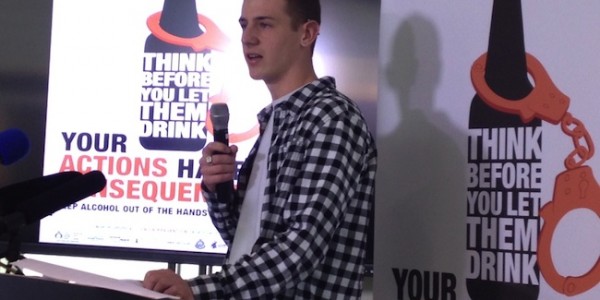Successful annual North Shore campaign targets youth drinking
Eighteen year old Zak Saint-Onge had his first taste of alcohol at age 12 after stealing a beer from his dad. By age 15, he was drunk every day and living in youth shelters after being kicked out of his home.
“Everyone I hung out with was drinking in excess, so I started doing it too. When I’d wake up with a hangover on the weekend, I just drank more to make it go away, and pretty soon the drinking was happening every day,” Saint-Onge says. “At first I was stealing booze from my parents’ liquor cabinet, but when that wasn’t enough I would just go to the liquor store and wait outside. Pretty much anyone between the age of 19 and 25 with a tattoo and cigarette would buy what I needed.”
Saint-Onge’s drinking problem eventually got so bad that he resorted to crime to pay for his habit and drinking vanilla extract and hand sanitizer if alcohol wasn’t available. While his is a story of extremes, unfortunately it isn’t completely unique—alcohol remains the drug of choice for teens, and when they can’t get it at home, they turn to adults. In fact, a West Vancouver student health survey found that a full 80 per cent of youth obtained alcohol directly from an adult, whether it was a parent, sibling, friend or stranger.
Sharing stories like Zak’s is at the heart of Vancouver Coastal Health and The North Shore Action on Prevention Task Force’s annual campaign to change the way people view youth access to alcohol. The campaign brings together members of the community, law enforcement, health and educators to share one important message: ‘Think before you let them drink.’
A new feature this year is two videos made by youth as part of a spring break cinema camp highlighting to both adults and youth the perils involved. The two videos can be seen at:
“Adults play a huge role in contributing to underage drinking, and we shouldn’t condone that,” says Kerrie Watt, alcohol and drug prevention educator at VCH and chair of the task force. “Young people are impressionable and they need to be guided and supported when it comes to making alcohol-free choices for themselves.”
VCH Medical Health Officer Dr. Mark Lysyshyn echoes these concerns: “This campaign is so important because it reminds the community that everyone has a role to play in protecting vulnerable young people from the harmful effects of alcohol,” he says.
In Canada, 70 per cent of youth reported drinking alcohol in 2012, with the average ‘age of initiation’ 16 years old. That same year, almost 60 per cent of underage drinkers reported binge drinking one or more times. Young people’s brains undergo rapid development during their teenage years—use of alcohol during this time can affect healthy brain development, and put a person at greater risk of developing alcohol dependence later on in life. In addition, binge drinking among young people increases the risk of accidents, violence, and injuries.
Although Saint-Onge is now back at home with his parents, finishing school and marking a year of sobriety, he doesn’t want others to go through what he did. “At the end of the day, if adults hadn’t given me the ways and means to get alcohol, there’s no way I would have developed such an addiction,” he says. “My life definitely wouldn’t have gone the path it did.”
This year’s ‘Think Before You Let Them Drink’ campaign is supported:
- North Vancouver RCMP
- West Vancouver Police Department
- Squamish Nation
- West Vancouver School District #45
- North Vancouver School District #44
- City of North Vancouver
- District of West Vancouver
VCH, the Ministry of Health, and the Ministry of Justice have also launched Alcohol Sense, (www.alcoholsensebc.ca)—a suite of online resources to help parents maintain healthy connections with their children so they can make healthier decisions around alcohol.

